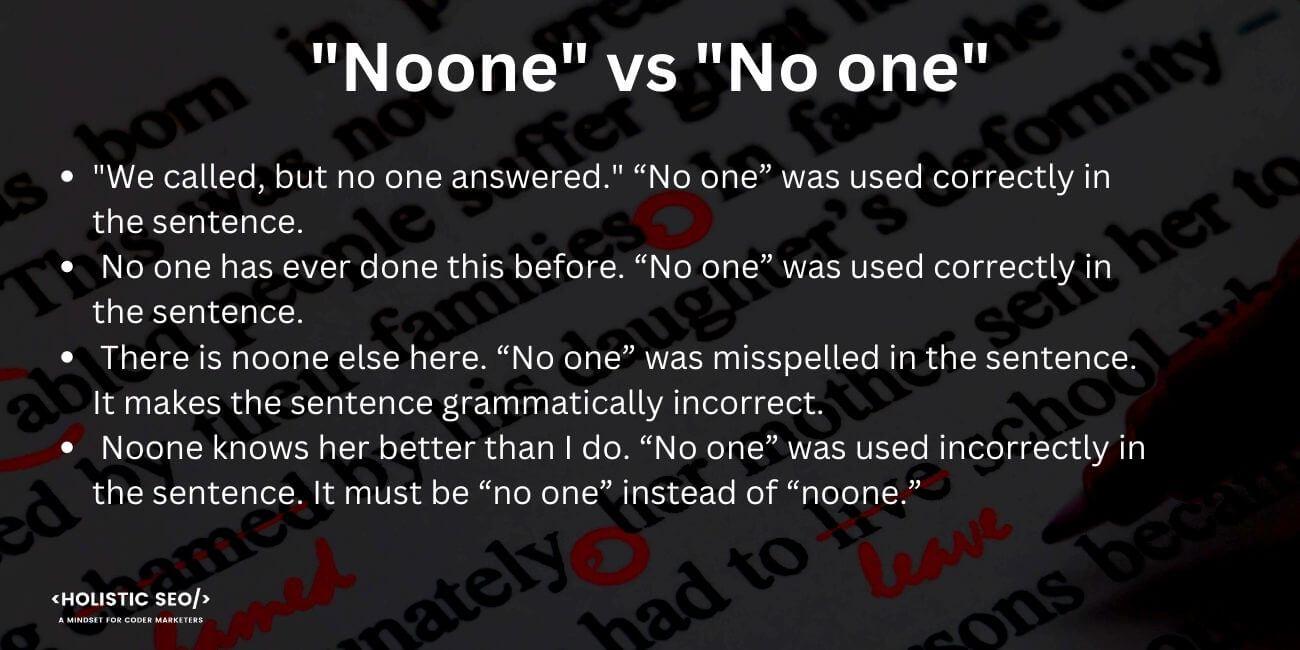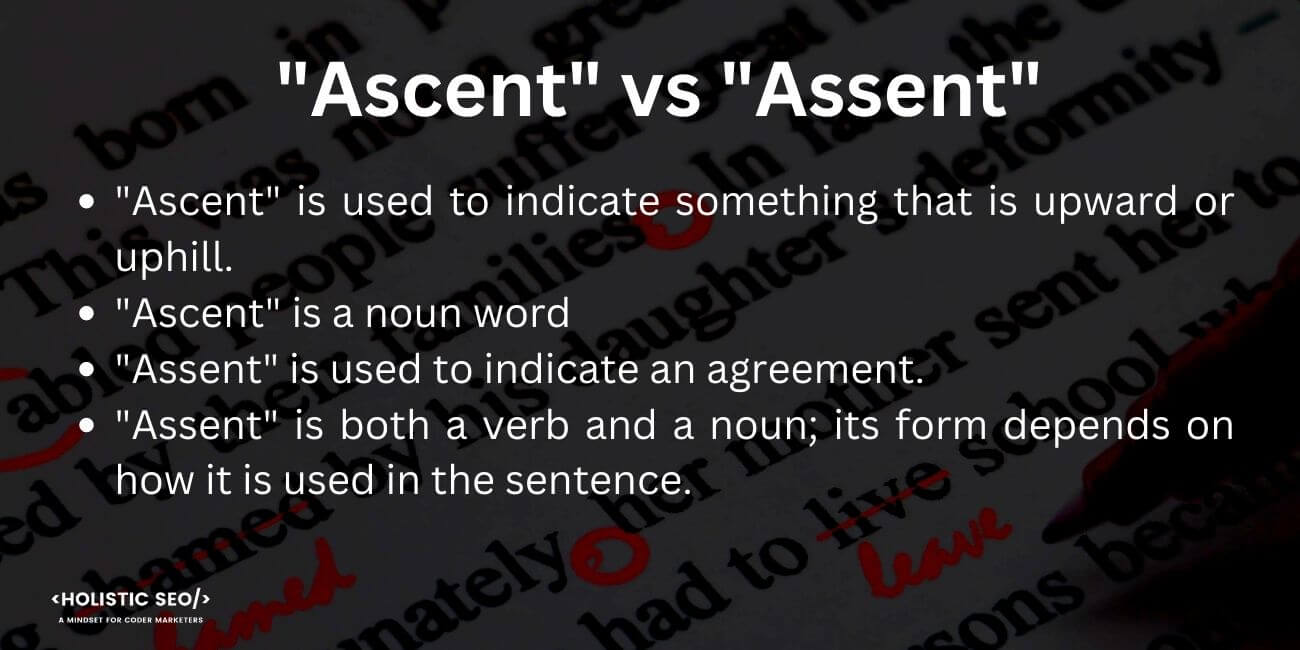“No one” is the correct spelling and form, while “Noone” is a standard grammar error. The common misspelling and grammar error for “No one” is “Noone.” The word “No one” does not have any other tenses. There is no root word for “no one,” mainly because the word itself is already basic. Additionally, there are no prefixes or suffixes for the word, as it does not have any other variations. Using the incorrect spelling of “No one,” which is “Noone,” in content writing negatively affects the content or article. It exhibits poor-quality content and the unprofessionalism of the writer. Misspelled words create confusion and an inability to convey the right message to readers. Hence, having proper knowledge as a content writer and knowing the distinction between these two words when writing is critical. The quality of the content depends on how well-written the structure of each of the sentences is.
Examples of the correct and incorrect spelling of “No one” are listed below.
- “We called, but no one answered.” “No one” was used correctly in the sentence.
- No one has ever done this before. “No one” was used correctly in the sentence.
- There is noone else here. “No one” was misspelled in the sentence. It makes the sentence grammatically incorrect.
- Noone knows her better than I do. “No one” was used incorrectly in the sentence. It must be “no one” instead of “noone.”
Which one is Correct, Noone or No one?
The correct form is “No one”. “Noone” is the commonly misspelled form of the word. Another incorrect form, spelled with a hyphen, is no-one. The word must be spelled without a hyphen, rather with space, and in two words, “no” and “one.” The only correct spelling and variation is “no one. Listed below are examples of the correct usage of “No one.”
- “No one believed anything she said.” The sentence that there is no single person that believes the other person.
- “There is no one awake.” The sentence states there is no single person that is awake.
- “No one bought their own things for their family outings.” The sentence means that not a single person on the family outing bought their own things for the vacation.
So the question is, is there a way to spell “Noone” correctly in the Present Continuous Tense?” Unfortunately, there is no present continuous tense of the word. There are no other tense variations of “No one.” The only way to make the present continuous tense of the word is to add other helping words in the sentence. Present Continuous Tense is the state that refers to the action that is happening at the moment and possibly is going to happen in the future. For example, “No one is going to play at the playground.” The sentence indicates that not a single person is going to play at the playground now, but there must be someone that is going to play in the future. The helping words to form the present continuous are the linking verb and verb, “is” and “going.”
How to Pronounce “Noone”?
“Noone” is the incorrect spelling of “No one.” Although misspelled, “Noone” is pronounced the same way as “No one.” The word is pronounced using two words, “no” and “one,” despite being one word. The two words are pronounced as “now-wuhn” in American English and “noh-wuhn” in British English.
What are the Correct Examples of “Noone” in Sentences?
The correct example of “Noone” is using its correct form, “no one.” Listed below are the correct examples of “noone” in sentences.
- “No one came to the kid’s birthday party.” The sentence means that no single person attended the kid’s birthday.
- “No one likes mom’s cooking.” The sentence states that no single person liked the cuisine cooked by the mom.
- “No one asks me anything.” The sentence means that not a single person has asked about anything.
- “No one expected that it would rain today.” The sentence states that no single person expected it to rain today.
- “No one has been honest lately.” The sentence means that no single person has been truthful in the past few days.
“How to Spell Noone and No one” Correctly in Past Tense?
There is no past tense spelling of noone and no one. However, the sentence is past tense when “noone” and “no one” is used along with other words. For example, “No one is in the house.” The sentence pertains to a situation currently happening. Certain words must be changed to turn them into past verb tenses. For instance, “No one was in the house.” The “is” is replaced with “was” to indicate that the sentence has already happened.
How to Pronounce “No one”?
“No one” is simply pronounced with only two syllables. These syllables are “now” and “wuhn.” However, there is a slight difference in how the word is pronounced in British English. “No one” is pronounced with a slight slang, “noh-wuhn.”
What is the meaning of No one?
“No one” is an indefinite pronoun defined by the Oxford Dictionary as “not anyone” or “no person.” The word came from only two words, “no” and “one.” The word “No One” is used after the word “Being,” meaning existence in the book of Thomas Metzinger, “Being No One: The Self-Model Theory of Subjectivity,” The word means “the state of not existing as a single person.” The word “being no one” means “not being an important or essential person” in a more detailed and philosophical meaning, Another example is from the book by Mark Messier and Jimmy Roberts, “No One Wins Alone: A Memoir.” The sentence means that “no single person wins on their own.” Moreover, the book “Leaving No One Behind: Humanitarian Effectiveness in the Age of the Sustainable Development Goals” by the United Nations Office for the Coordination of Humanitarian Affairs shows the correct use of “No One.” “No one” is used here as a replacement for a noun. It means “leaving no person behind.”
What is the Etymology of No one?
“No one” came from two words, “No” and “One.” “No” is commonly used as a convention to respond negatively to a question and refuse an offer or request. “No” functions as a determiner and adverb. “No,” as a determiner, emphasizes and indicates something is forbidden. “No,” as an adverb, makes the negative form of a comparative. On the other hand, “one” is defined by the Oxford Dictionary as “a single” thing or person. The definition of “no one” is “not a single person.”
How to Use No one in a sentence?
“No one” is an indefinite pronoun that refers to the absence of something or someone. It is grammatically negative and functions as a noun that follows a positive verb. For example, “My family did not attend my graduation.” “No one” is allowed to replace the noun “My family,” but the verb must be changed to avoid a double negative sentence. The verb “did not” must be omitted. The correct sentence is now, “No one attended my graduation.” The sentence “No one did not attend my graduation” means that no single person has attended the graduation. It is important to change the verb that follows the indefinite pronoun as well if the intended message of the sentence is “no single person.” Otherwise, the content writer is going to convey the opposite of the intended message of the content.
What are the Synonyms of No one?
Listed below are the synonyms of No one.
- Nobody: Nobody is the closest synonym of “No one.” Nobody, as a noun, means“ no person.” Nobody, as a noun, means “a person of no importance or authority” It came from the root word “no” and “body.” It is pronounced differently in certain places. The common pronunciation of the word is “now-buh-dee.” However, in British English, the word is pronounced as “noh-buh-dee”
- None: None is a synonym of “No one” as well, but it has another meaning. Unlike “No one,” “None” refers to a person and a thing. The word refers to the absence of a person or a thing. For example, “None of the students submitted their assignment on time.” The sentence means that no single person passed their assignment by the set deadline. “No one” is allowed to replace “none” as it is going to give the same meaning in the sentence. Another example is, “He ate everything served on the table, so none was left for the other guests.” The sentence means that the subject, He, has already eaten all the food on the table, and there is no food left for the guest to eat. “No one” and “None” is not interchangeable, despite being synonyms for one another. “He ate everything served on the table, so no one left for the other guests” is grammatically incorrect.
On that note, does a content writer uses a synonym of “No one” if they do not remember the correct form? The answer to that is both yes and no. It is appropriate to use the synonyms of “no one” in some cases that the meaning and function of the word are the same. “Nobody” and “No one” is allowed to be used interchangeably, mainly because the sentence is going to have the same meaning. On the other hand, “none” has other different meanings compared to “no one.” There are instances when the two words are interchangeable as it is going to be grammatically incorrect. The better synonym to replace “no one” is “nobody.”
What to Know for Using “Noone” and “No one” for Using in Content Writing?
Listed below are the things that a content writer must know when using “noone” and “no one” in their writing.
- Meaning Differences for No one Variations: “No one” means not a single person. It is used as an indefinite pronoun in a sentence. On the other hand, “Noone” has no meaning. It is not included in any dictionary, as it is an incorrect spelling of the word “no one.”
- Accent Difference for No one Variations: “No one” is pronounced slightly differently by Americans and British. However, pronunciation does not affect the word’s spelling in content writing.
- Correct Spelling for No one: The correct spelling for the word is N-O O-N-E. The space between the two words is the most important part, mainly because N-O-O-N-E is the incorrect spelling of the word.
How to Fix Incorrect uses of Noone in Content Writing and Marketing?
Excellent content writers always ensure that they use the right and relevant words and that there are no misspellings. Do not forget to add space between the two words to fix the incorrect uses of Noone in Content Writing and Marketing. Add a space between “no” and “one” to create two words instead of one word, “Noone.” The correct spelling is formed, “No one.” Additionally, proofread the content before submitting or publishing it to avoid grammatical errors, such as misuse and wrong spelling.
What are the Other Nooneing Examples similar to “Noone” and “No one”?
Listed below are the other misspelled examples, similar to “Noone” and “No one.”
- Maintenance and Maintainance: “Maintenance” is the correct spelling, while Maintainance” is the wrong spelling. One of the misspelled words is “Maintenance” and “Maintainance” because the root word for Maintenance is “maintain.” It is only natural to spell “Maintainance” rather than “Maintenance.”
- Separate and Seperate: “Separate” is the correct spelling, while “Seperate” is incorrect. Separation refers to the action or state of being moved apart. The word “rat” as the second syllable must be remembered in determining the difference between “Separate and Seperate” to avoid committing spelling errors.
- Pronunciation and Pronounciation: “Pronunciation” is the correct spelling, while “Pronounciation” is incorrect. Pronunciation is the act or manner of pronouncing something. One of the misspelled words is “Pronunciation and Pronounciation” because the root word for “Pronunciation” is “pronounce.” It is only natural to commit the mistake of spelling the word “Pronounciation.”
- Liaison and Liason: “Liaison” is the correct spelling, while “liason” is incorrect. “Liaison” is a person who establishes communication between multiple groups.One of the misspelled words is “Liaison” and “Liason” because of its pronunciation, “lee-ay-zaan,” which is the same pronunciation of “Liason.”
- Privilege and Priviledge: “Privilege” is the correct spelling, while “Priviledge” is incorrect. “Privelege” refers to a special right, advantage, or immunity granted or available only to a particular person or group. One of the misspelled words is “Privilege” and “Priviledge” because of their same pronunciation, “pri-vuh-luhj.”
- Writing and Writting: “Writing” is the correct spelling, while “Writting” is incorrect. “Writing” is the process of representing a language with symbols or letters in a text or document with meaning. One of the misspelled words is “Writing” and “Writting” because of the pronunciation. “write-ing.”
- Occurred and Occured or Ocurred: “Occured” is the correct spelling, while “Occurred” and “Ocurred” are the wrong ones. The correct form is spelling with both double “C” and double “R. ”Occurred is an action word that is defined as “to happen.” Various people get confused with “Occurred,” “Occured,” and “Ocurred” because of multiple letters on the word.
- Paid and Payed: “Paid” is the correct spelling, while “Payed” is grammatically incorrect. “Paid” is the past tense for “pay,” meaning “to give money as a compensation or form of payment.” One of the misspelled words is “Paid” and “Payed” because of the rules in forming the past tense of a word. The general rule for forming the past tense is to add -ed or -d at the end of the word. However, there are exceptions to the rule. Verbs ending in -y, shall remove the letter “y” and be replaced by the letter -id if the preceding letter is a consonant. However, the letter “y” shall not be replaced, and -ed is added at the end of the letter before “y” is a vowel. For example, “play” turns into “played” and not “plaied.”
- Surprise and Suprise or Surprize: “Surprise” is the correct spelling of the word, while “Suprise” is the incorrect one. On the other hand, “Surprize” is not technically incorrect. It was an alternative spelling of “Surprise” but is rarely used nowadays. “Surprise” is defined as an event that happens suddenly or unexpectedly. One of the misspelled words is “Surprise” and “Suprise” or “Surprize” because the first “R” is not pronounced.
- Truly and Truely: “Truly” is the correct spelling, while “Truely” is grammatically incorrect. One of the misspelled words is “Truly” and “Truely” because the root word for Maintenance is “true.” It is only natural to spell “Truely.” Truly thing or a subject being talked about is accurate, precise, or exact.
- Gist or Jist: “Gist” is the correct spelling, while “Jist” is the common misspelling of the word. “Gist” is defined as the main or general message of a piece of writing, a speech, or a conversation. One of the misspelled words is “Gist” and “Jist” because of the pronunciation, “jist.”
There are several reasons why these certain misspellings are committed. Some reasons are the root word and past tense rule. There are instances that the spelling of the root word is different from the other form of the word. For example, “Maintenance” came from the root word “Maintain,” and “Pronunciation” came from the root word “Pronounce.” There are specific rules for forming the past tenses of words. These include adding -ed, -d, and replacing the “y” with -eid.
How does Writing “Noone” wrong affect SEO and Content Marketing?
Misspelled words such as “Noone” affect Search Engine Optimization (SEO) and Content Marketing. Grammatical errors like incorrect spelling and usage of words in writing unintentionally change what authors want to convey. It delivers a different meaning to the reader when a word is misused in a sentence. Additionally, a word with the wrong spelling conveys unprofessionalism. Incorrect grammar disturbs the flow of one’s writing as it affects the user experience of a reader and causes misinformation. It gives the impression that the author is not knowledgeable, skillful, or credible enough to write high-quality content. Quality content matters in Search Engine Optimization (SEO). Most websites that rank top contain quality written articles. Poorly written articles with misspelled and misused words are going to hurt a website. On average, 59% of consumers do not buy from an online shopping site with bad spelling and poor grammar, according to surveys conducted by some agencies. An excellent content writer must know the SEO Guide, such as the E-A-T. E-A-T refers to Expertise, Authoritativeness, and Trustworthiness. They must exhibit proper word spelling for their content to rank up in the search engine. Content writers must know their target readers to know what word is supposed to be used. The content is going to have a higher E-A-T score that influences Google or search engine ranking.
- 48 Online Shopping and Consumer Behavior Statistics, Facts and Trends - August 22, 2023
- B2B Marketing Statistics - August 22, 2023
- 38 Podcast Statistics, Facts, and Trends - August 22, 2023


